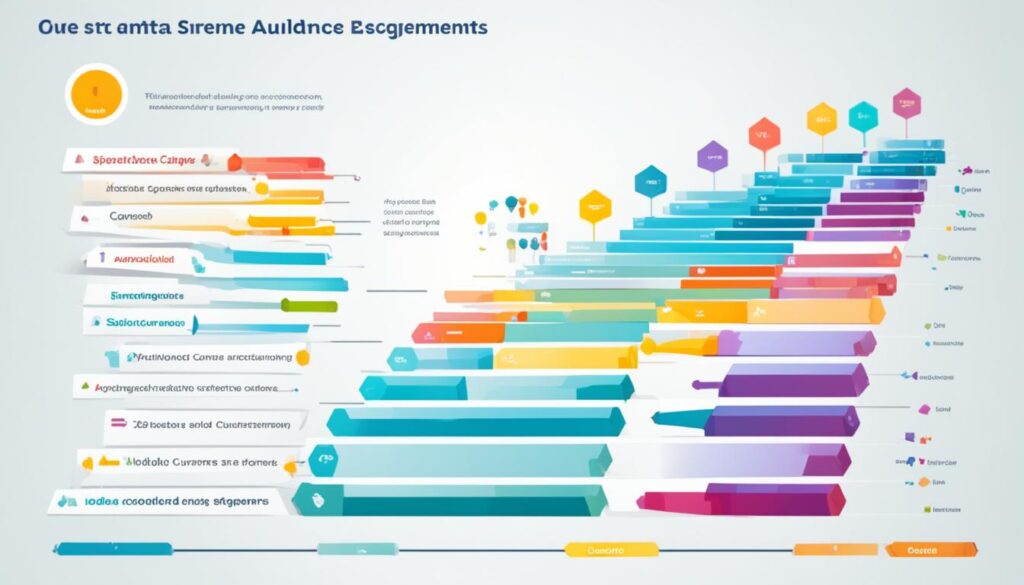In today’s digital landscape, search engine optimization (SEO) plays a crucial role in the success of any online business. With the ever-evolving algorithms and fierce competition for online visibility, companies are constantly seeking innovative ways to improve their SEO strategies.
One such powerful tool at their disposal is big data. By harnessing the vast amount of information generated by various sources, businesses can gain valuable insights that can significantly enhance their SEO efforts. Big data analytics provides a wealth of data-driven strategies and techniques that can optimize SEO performance and drive organic traffic to websites.
From understanding the audience to analyzing competitors, and optimizing content, big data empowers digital marketers to make informed decisions and stay ahead in the dynamic world of SEO. Let’s delve deeper into how you can leverage big data for improved SEO in your digital marketing campaigns.
Key Takeaways:
- Using big data analytics can enhance your SEO strategy and drive organic traffic.
- Big data provides valuable insights into your target audience and helps create personalized content.
- Analyzing competitors’ SEO strategies can uncover opportunities and ensure a competitive edge.
- Optimizing content with big data insights improves SEO performance and user experience.
- Big data-driven SEO tactics lead to increased visibility, organic traffic, and improved ROI.
Understanding Your Audience Through Big Data
Big data is a treasure trove of insights that can help businesses truly understand their audience. By harnessing the power of big data analytics, marketers can gain valuable information about their audience’s demographics, interests, behavior, and intent.
One of the key benefits of using big data is audience segmentation. By analyzing vast amounts of data, businesses can identify distinct audience groups and tailor their marketing efforts to meet the unique needs and preferences of each segment. This personalized approach allows for more targeted and effective communication, leading to improved engagement and conversions.
Tools like Google Analytics and SEMrush provide comprehensive data about audience views, time duration, bounce rate, user journey, demographics, and user inputs. These valuable insights enable businesses to paint a clearer picture of their audience and make informed decisions about their SEO strategy.
For instance, let’s say a clothing retailer wants to understand the preferences of its millennial audience. By analyzing big data, the retailer can determine which fashion trends are most popular among millennials, their preferred shopping channels, and the specific types of content that resonate with this audience segment.

Segmentation by Demographics:
| Age Group | Gender | Location |
|---|---|---|
| 18-24 | Female | New York |
| 25-34 | Male | Los Angeles |
| 35-44 | Male | Chicago |
Using this information, the retailer can create targeted marketing campaigns, personalized product recommendations, and relevant content that appeals to each specific audience segment. This level of personalization can greatly enhance the overall customer experience and drive better SEO performance.
By leveraging big data, businesses can gain a deep understanding of their audience and develop strategies to effectively engage with them. Whether it’s through analyzing audience behavior, identifying common interests, or optimizing content based on audience preferences, big data enables marketers to create personalized experiences that resonate with their target audience.
Overall, by understanding their audience through big data, businesses can unlock valuable insights and make data-driven decisions that optimize their SEO strategy and drive meaningful results.
Analyzing Competitors with Big Data
Big data is a powerful tool for gaining a competitive advantage in the world of SEO. By analyzing competitors’ strategies using data analytics, businesses can benchmark their performance, identify gaps and opportunities, and fine-tune their own SEO approach to stay ahead in the game.
Tools like SEMrush and Ahrefs provide invaluable insights into competitors’ rankings, traffic, conversions, backlinks, and content performance. This wealth of data allows businesses to gain a deep understanding of their competitors’ SEO tactics and adjust their own strategy accordingly.
“Analyzing competitors with big data is like getting a glimpse into their playbook. It enables businesses to identify the keywords and content that are driving their competitors’ success and leverage that knowledge to optimize their own SEO.”
By utilizing big data tools, businesses can perform scalable competitor analysis within target segments, measure market share, and uncover areas of opportunity. This data-driven approach helps businesses make informed decisions, identify industry trends, and strategically position themselves in the market.
Detailed Competitor Analysis
A thorough competitor analysis involves examining various aspects of competitors’ SEO strategies:
- Keyword Analysis: Identify the keywords your competitors are ranking for and discover new keyword opportunities.
- Backlink Analysis: Analyze competitors’ backlink profiles to identify authoritative sources and gain insights into effective link building strategies.
- Content Analysis: Evaluate competitors’ content performance to understand what types of content resonate with their audience and attract organic traffic.
- SEO Performance Analysis: Compare competitors’ domain authority, page rankings, and organic search traffic to assess their overall SEO performance.
By conducting a detailed analysis of competitors’ SEO efforts with the help of big data tools, businesses can uncover hidden insights, identify gaps, and capitalize on untapped opportunities.

| Competitor | Rankings | Traffic | Conversions |
|---|---|---|---|
| Competitor A | 1st | 10,000 | 500 |
| Competitor B | 3rd | 8,000 | 400 |
| Competitor C | 5th | 6,000 | 300 |
The table above illustrates how businesses can use big data to benchmark competitors’ rankings, traffic, and conversion metrics. By analyzing this data, businesses can gain insights into their competitors’ performance and strategize accordingly.
Competitor analysis through big data empowers businesses to make data-driven decisions, outperform competitors, and seize opportunities within their respective markets. The insights gained from analyzing competitors with big data can guide businesses in optimizing their SEO strategies and achieving better organic search rankings and website performance.
Optimizing Content with Big Data Insights
Big data provides valuable insights that can help businesses optimize their content and improve their SEO performance. By leveraging data analytics, companies can perform keyword research, conduct content audits, and optimize their content for mobile-friendliness and voice search. Let’s explore how big data can enhance content optimization.
Keyword Research with Data Analytics
Keyword research is a crucial step in optimizing content for search engines. With the help of big data analytics, businesses can uncover the most relevant keywords that align with their target audience’s search intent. By analyzing search volume, difficulty, and relevance, companies can identify high-potential keywords to optimize their content and increase organic traffic.
Tools like Google Keyword Planner, SEMrush, and Ahrefs provide valuable data on keyword performance, allowing businesses to make data-driven decisions when optimizing their content for better search rankings. By incorporating these insights, companies can create targeted content that aligns with the interests and needs of their audience.
Content Audits and Optimization
Content audits play a crucial role in ensuring that published content is optimized for search engines. By using big data, businesses can conduct content audits to identify areas of improvement and ensure their content is fresh, readable, and well-structured.
With big data analytics, businesses can assess the performance of their content, including metrics like page views, bounce rate, time on page, and social shares. These insights help companies identify underperforming content that needs optimization or updates. By optimizing existing content based on big data insights, businesses can improve its visibility and drive more organic traffic.
Mobile-Friendliness and Voice Search Optimization
In today’s mobile-centric world, mobile-friendliness is crucial for SEO success. Big data can help businesses optimize their content for mobile devices by providing insights into user behavior, preferences, and browsing patterns.
By leveraging big data, companies can understand how users interact with their content on mobile devices and optimize it accordingly. This includes using responsive design, ensuring fast load times, and creating content that is easy to navigate and read on smaller screens.

Voice search is another emerging trend that impacts content optimization. As voice assistants like Siri, Alexa, and Google Assistant become more prevalent, optimizing content for voice search queries is essential.
Big data can help businesses understand users’ voice search behavior by analyzing voice queries and patterns. By incorporating relevant long-tail keywords and answering conversational queries, businesses can optimize their content for voice search, enhancing its visibility in voice search results.
In conclusion, big data provides invaluable insights to optimize content for better SEO performance. By conducting keyword research, performing content audits, and optimizing for mobile-friendliness and voice search, businesses can increase their organic visibility and attract more targeted traffic to their website.
Conclusion
Big data has revolutionized search engine optimization (SEO) in the realm of digital marketing. Leveraging big data insights, businesses can gain a comprehensive understanding of their target audience, analyze competitors, optimize content, and measure campaign performance. By utilizing data analytics, companies can make well-informed decisions, personalize marketing campaigns, identify effective channels, and assess campaign success.
The benefits of incorporating big data-driven SEO tactics are plentiful. Firstly, leveraging big data allows businesses to gain deeper insights into their audience, thus enabling them to create highly personalized and tailored content that resonates with their users. Secondly, data analytics help businesses accurately analyze competitors and identify gaps and opportunities in the market, allowing them to stay one step ahead.
Moreover, big data enables businesses to optimize their content, taking into account factors such as mobile-friendliness, voice search, semantic search, and user intent. By aligning with these trends and preferences, companies can enhance their SEO performance and improve their organic traffic and visibility. In turn, this drives increased ROI in their digital marketing efforts.
In conclusion, big data has emerged as a powerful tool for improving SEO in digital marketing. By harnessing the power of data analytics, businesses can gain valuable insights, make informed decisions, and take proactive measures to optimize their SEO strategy. In doing so, they position themselves for success in the competitive digital landscape, achieving higher visibility, attracting more organic traffic, and ultimately driving business growth.
FAQ
How can big data help improve search engine optimization (SEO) in digital marketing?
Big data provides valuable insights into audience demographics, interests, behavior, and intent, allowing businesses to optimize their SEO strategy and create personalized content. It also helps analyze competitors’ strategies and optimize content for factors like mobile-friendliness and user intent.
What tools can be used to understand the audience using big data?
Tools like Google Analytics and SEMrush provide detailed information about audience views, time duration, bounce rate, user journey, demographics, and user inputs, enabling businesses to gain insights into their target audience and make informed decisions about SEO strategy.
How can big data be used to analyze competitors’ SEO strategies?
Tools like SEMrush and Ahrefs offer valuable insights into competitors’ rankings, traffic, conversions, backlinks, and content performance. By analyzing this data, businesses can identify gaps and opportunities in the market and adjust their SEO strategy accordingly.
How does big data help optimize content for better SEO performance?
Big data allows businesses to perform keyword research based on relevance, volume, difficulty, and intent, helping optimize content with the right keywords. It also helps identify areas of improvement such as content freshness, readability, structure, and optimization.
What are the benefits of using big data for SEO in digital marketing?
Leveraging big data enables businesses to gain a deeper understanding of their audience, analyze competitors, optimize content, measure results, and continuously improve their SEO strategy. This leads to enhanced visibility, increased organic traffic, and improved ROI in digital marketing efforts.








